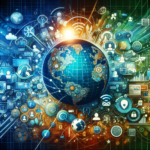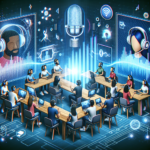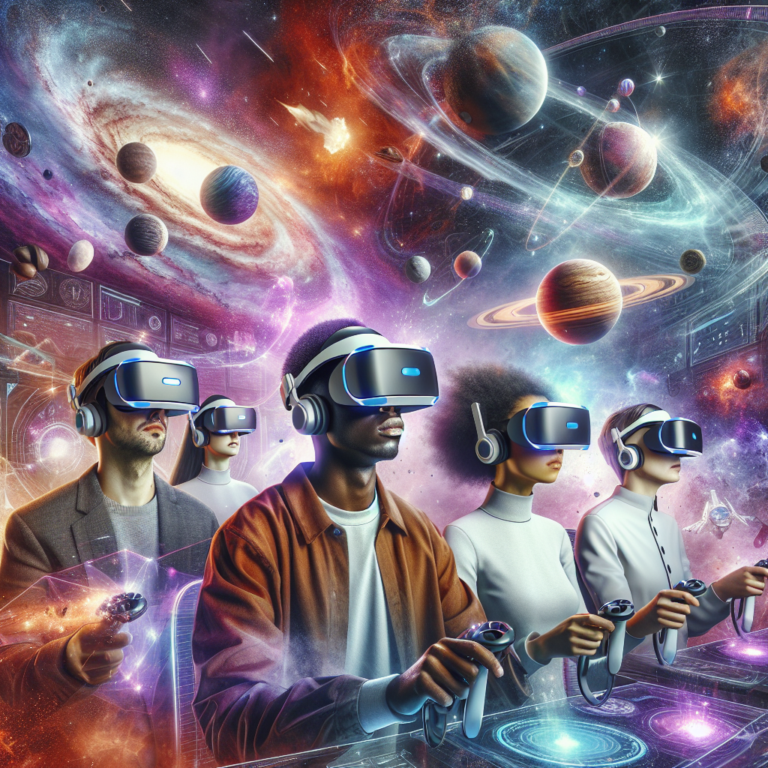Embark on a Cosmic Adventure: The Future of Virtual Reality Space Exploration 🌌
VR Space Education: A New Frontier in Virtual Reality 🚀
Imagine stepping into a universe where the limitations of Earth fade away, and you’re free to explore the vastness of space. Thanks to the transformative power of virtual reality (VR), this dream is inching closer to becoming a reality! What if VR could allow users to experience space travel firsthand, witnessing celestial wonders and journeying through the cosmos? In this blog post, we’ll delve into the possibilities that VR technology holds for exploring the universe and what it could mean for both education and entertainment.
The Technology Behind the Magic
Virtual reality has evolved rapidly in recent years, merging cutting-edge technology with immersive experiences. To understand how VR can take us to the stars, let’s take a closer look at some of the key components:
1. Advanced Graphics and Computing Power 🎨
The lifelike imagery rendered through state-of-the-art graphics engines enables VR users to experience breathtaking galaxies, nebulae, and planetary landscapes. Thanks to powerful graphics processing units (GPUs), users can engage with intricate details that make these celestial bodies come alive.
2. Immersive Audio Experience 🎶
Sound plays a crucial role in creating a sense of presence. By incorporating spatial audio, users can hear the unique characteristics of each environment—from the silence of space to the sounds of spacecraft engines, enhancing the overall experience.
3. Motion Tracking and Haptic Feedback 🔄
Advanced motion tracking ensures that a user’s movements in the virtual realm are mirrored accurately. Coupled with haptic feedback devices, this technology lets users feel sensations, like spacecraft vibrations or the weightlessness of zero gravity, making the experience more tangible.
VR Space Education: What You Could Experience
With the technological enhancements mentioned above, the possibilities for space exploration in virtual reality are virtually limitless. Here are some exhilarating experiences users might encounter:
1. Orbiting Planets 🌍
Imagine floating in the orbit of Earth, gazing down at the shimmering blue planet, or orbiting Mars and observing its rust-colored landscape. VR would allow users to witness planetary rotations in real-time and experience the transition between day and night on distant planets.
2. Navigating Through the Stars ✨
Users would have the opportunity to chart their own courses through star systems, traveling to iconic destinations such as the Andromeda Galaxy or the Orion Nebula. The experience could simulate space travel, letting participants feel the thrill of speed as they traverse vast distances across the universe.
3. Exploring Unique Celestial Phenomena 🌠
What if you could witness a supernova eruption or observe a black hole from a safe distance? VR could allow users to zoom into these cosmic events and see the stages of their formation, comprehension deepened by informative narrations from space scientists.
4. Visiting Space Stations and Colonies 🛰️
VR Space Education: Imagine exploring the International Space Station as if you were an astronaut on a mission! Not only could users navigate through existing space stations, but they could also visit conceptual colonies on Mars or the Moon, engaging with hypothetical habitats designed for human existence.
The Educational Aspect of VR Space Exploration 🧑🎓
Beyond entertainment, the educational potential of VR in space exploration cannot be overstated. Here’s how this technology could revolutionize learning:
1. Immersive Learning Experiences
Virtual reality can transform how students engage with complex astronomical concepts. Instead of reading about distant planets in textbooks, they could explore them firsthand, making learning interactive and impactful.
2. Real-Time Data Visualization 📊
When learning about space missions, students can analyze real-time data. They could virtually attend live mission briefings, understanding everything from trajectory calculations to the physics of space travel.
3. Enhanced Engagement and Collaboration 🌐
VR platforms can support multi-user experiences, allowing students from various locations to collaborate on projects. Working together to design a spacecraft or simulate a lunar landing can facilitate teamwork and enhanced understanding of scientific principles.
The Future of Space Tourism Through VR 🌍✨
As VR technology continues to mature, space tourism may no longer be a distant dream but a feasible adventure. While physical space travel comes with huge risks and costs, VR provides a safe and economical alternative. Here’s why:
1. Accessibility for All
Current space tourism options target a select few with significant financial resources. In contrast, VR makes space exploration accessible to everyone, enabling people to experience the wonders of the universe without the hefty price tag.
2. Safe Exploration Without Health Risks 🚑
Space travel isn’t for the faint-hearted; it involves considerable health risks and psychological challenges. VR can simulate the experience without the dangers of microgravity and radiation, allowing timid adventurers to taste the thrill of space travel safely.
Community and Social Connectivity in Virtual Space 🌌
VR doesn’t just redefine exploration; it also fosters a sense of community. Here’s how:
1. Social Experiences in the Cosmos
Participants can join friends or meet new people in virtual space scenarios, attending virtual conferences, stargazing events, or even virtual launches. This interactivity builds friendships and shared experiences as users explore the universe together.
2. Communities of Enthusiasts 💬
Imagine joining a community of space exploration enthusiasts where you can share experiences, knowledge, and dream projects. VR platforms can host forums or groups focused on specific topics of interest, such as exoplanets or space engineering.
Parting Visions: The Endless Possibilities Ahead 🌠
As we push the boundaries of what’s possible with virtual reality, the potential to explore the universe is more promising than ever. Whether for education, entertainment, or simply the love of exploration, VR is set to unlock the secrets of the cosmos for everyone. The next time you look up at the night sky, remember that through VR, your journey to the stars may just be a headset away!




0 Comments